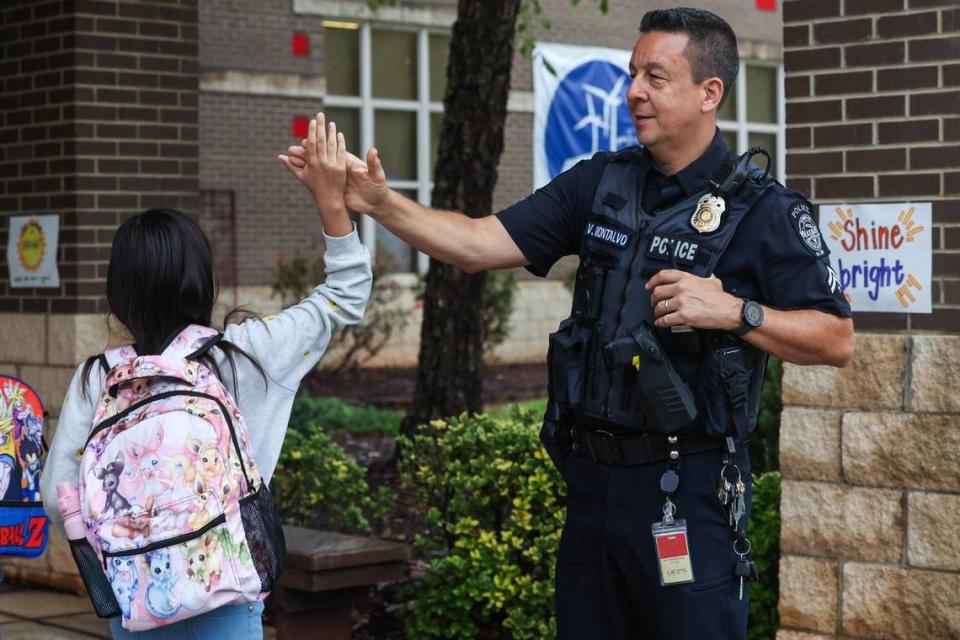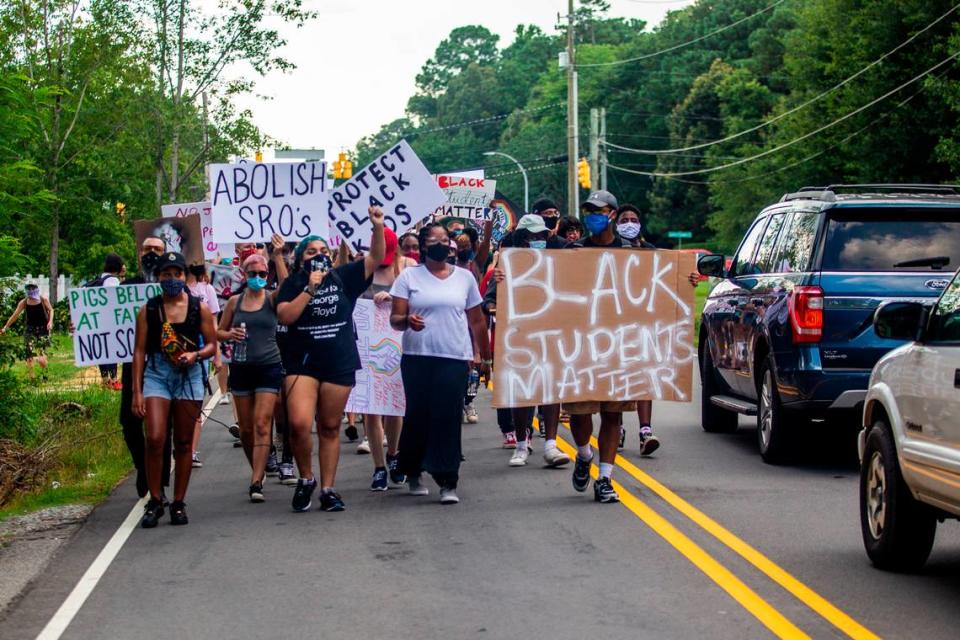ACLU wants cops out of NC schools, cites high rates of charges against Black students
- Oops!Something went wrong.Please try again later.
Black students are more likely than white classmates to be charged with disorderly conduct — data that the American Civil Liberties Union (ACLU) says shows policing in North Carolina schools is arbitrary and discriminatory.
The new “Consequences of Cops in North Carolina Schools” report released Thursday by the ACLU of North Carolina highlights racial disparities in school-based complaints and disorderly conduct in school charges.
The ACLU wants schools to replace school resource officers with more counselors, nurses, social workers and psychologists to help meet the mental health needs of students.
“Reliance on policing in schools in North Carolina does not work,” Amanda Meyer, staff attorney in the ACLU Racial Justice Program, said in an interview. “This has made students less safe and not more. This has created a climate of distrust and fear, especially for Black students and students with disabilities.”
The report comes at a time of rising concerns about school safety. Security lockdowns and the installation of weapons detectors have become far more common..
North Carolina has seen a 170% increase in state funding for school resource officers in the past five years. Once typically found only in high schools and middle schools, more officers are being placed in elementary schools after last year’s mass school shooting in Uvalde, Texas.
“If you have a threat that comes to a school, do you really want to wait for the officer to come?” Leon Godlock, a longtime school resource officer and ex-officio member of the North Carolina Association of School Resource Officers, said in an interview. “Officers really deter more crimes than are being reported.”

Disparities in disorderly conduct charges
The report particularly focuses on the state’s “disorderly conduct in schools” law, which makes it a crime to “disrupt, disturb, or interfere with teaching.” The ACLU says this can put students into the state’s criminal legal system and produce negative lifelong consequences..
“Vague laws like the disorderly conduct in schools law give police officers unbridled discretion to define when, and under what circumstances, typical childhood conduct crosses the line into criminal behavior,” according to the report.
Between 2017 and 2023, law enforcement and school staff filed school-based complaints of disorderly conduct against Black students at four times the rate of white students. Black students accounted for 56% of the disorderly conduct referrals while making up 23% of the youth population.
The disparities are widening, according to Meyer, who is one of the report’s authors. Between 2021 and 2023, Black students were being referred for disorderly conduct at five times the rate of white students.
The ACLU found other county-level data that raised concerns.
▪ The report singles out how Black students in Gaston, Forsyth, Moore, Wake and Pitt counties were referred 23 to 42 times more than white students for disorderly conduct. In Wake County, Black students were 26 times more likely than white students to be referred.
▪ From 2017 to 2023, schools in 25 counties referred only Black students for disorderly conduct. In 21 of those counties, Black students account for less than 50% of the student population.
▪ Six counties that had at least 50 disorderly conduct referrals didn’t refer a single white student. Black students made up less than 50% of the student population in all six counties.

CMS tries to address student behavior
Between 2017 and 2022, the report found that law enforcement and school staff filed school-based complaints against Black students at three times the rate of their white counterparts.
The report says the racial disparities are the highest in Madison, Vance, Washington, Mecklenburg, New Hanover, Forsyth, Nash, Durham, Chatham and Tyrell counties.
“It really shines the light on the harm police in schools are having,” Meyer said. “Police officers in schools have not been shown to improve safety. Police officers are doing more harm than good for Black students and students with disabilities.”
The ACLU report mirrors what CMS school board members discussed in February when they said making the reduction of out-of-school suspensions a priority.
Black students are being suspended disproportionately compared to others, according to a Charlotte-Mecklenburg Board of Education Progress Monitoring Report.
CMS is addressing the problem with two initiatives: Intervention Centers and more behavioral specialists.
Behavior of Black students
The statewide racial disparities exist even though Meyer says Black students don’t misbehave more than white students. Instead, she said, the current climate of policing in schools makes adults more susceptible to act on implicit biases against Black students.
“It is well-established that Black students are not generally more likely to misbehave than other students, even after accounting for different socioeconomic backgrounds, yet adults are far more likely to punish Black students (and to punish them severely) than their white peers for similar conduct,” the report says.
The ACLU report has several recommendations, including repealing the disorderly conduct in schools law and ending “the regular presence of law enforcement in schools.” The ACLU says more mental health staff should be hired to help schools reach nationally recommended staffing levels.
SROs are doing an ‘awesome job’
The impact of police on campus is far more positive, according to Godlock, who has been a school resource officer for more than 20 years. Godlock came out of retirement with the Rutherford County Sheriff’s Office to serve as a part-time school resource officer.
“I will work wherever I’m needed,” Godlock said. “You have to have a love and concern for young people. The majority of officers who work in schools want to be there.”
Godlock said most school resource officers “are doing an awesome job.” He said school resource officers can build positive relationships with students that lead to tips that prevent crimes from happening.
On Wednesday, Godlock said the relationships he’s built with students led to him being told that a middle schooler had brought a small knife to school.
“What if that knife had been a gun?” Godlock said. “The presence of a positive school resource officer that interacts with the children really helps make the children safer. It’s not just the SRO’s eyes. By establishing positive relationships with the kids, you’ve got everyone looking.”
After finding the knife, Godlock contacted the state Department of Public Safety’s Office of Juvenile Justice and Delinquency Prevention. Godlock says he was told he didn’t need to file an incident report and could leave the matter in the hands of the school.
Since the state’s “Raise The Age” law went into effect on Dec. 1, 2019, Godlock says more cases involving students have been diverted away from the legal system. Under that law, teens ages 16 and 17 are no longer automatically charged as adults for all crimes.
“Regardless of color or race, officers are helping young people get rehabilitation instead of incarceration,” said Godlock, who is Black.

